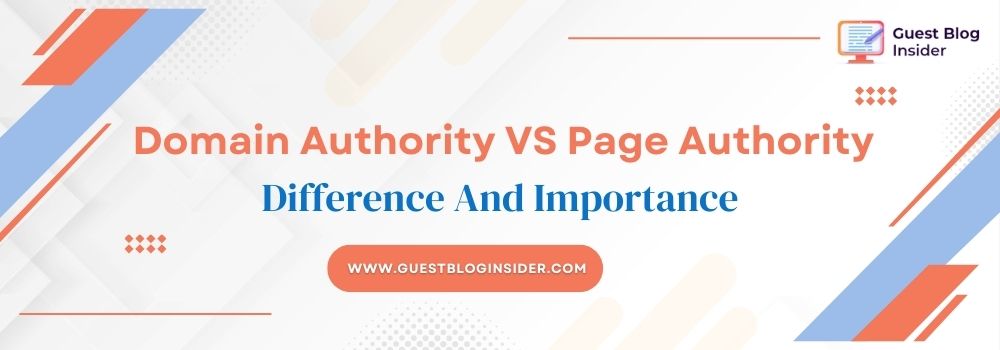Domain Authority vs Page Authority: Difference And Importance
- Guest Blog Insider
- June 20, 2023
In the realm of search engine optimization (SEO), two crucial metrics play a significant role in determining the online visibility and ranking of a website: Domain Authority (DA) and Page Authority (PA). While they may seem similar, it’s essential to understand their differences and grasp their importance to devise effective SEO strategies. In this article, we will delve into the disparities between DA and PA, and shed light on their individual significance in the digital landscape.
Domain Authority
Domain Authority is a metric developed by Moz, a renowned SEO software company, to predict a website’s ranking potential in search engine results pages (SERPs). It measures the overall strength and credibility of an entire domain. DA is calculated on a scale of 1 to 100, with higher scores indicating a greater ability to rank prominently in search results.
Importance of Domain Authority
Domain Authority relies on various factors, including the number and quality of incoming links, the overall link profile, the age of the domain, and the website’s overall SEO health. The more high quality backlinks a domain has, the higher its Domain Authority is likely to be.
1. Competitive Analysis
Domain Authority serves as an excellent benchmark for comparing the strength of different domains within a specific niche. It allows businesses to evaluate their competitors’ authority and devise strategies to improve their own.
2. Link Building
Websites with higher Domain Authority are often perceived as more authoritative by search engines. Acquiring backlinks from such sites can significantly boost a website’s credibility and visibility.
3. Potential Ranking
While Domain Authority is not a direct ranking factor, it correlates strongly with higher search engine rankings. Websites with higher DA tend to have better chances of ranking well for competitive keywords.
Page Authority
Page Authority, also developed by Moz, is a metric that predicts the ranking potential of a specific webpage rather than an entire domain. It is measured on a scale of 1 to 100, similar to Domain Authority. PA is influenced by various factors, including the quality and relevance of the content, the number and quality of backlinks pointing to the specific page, and the overall SEO optimization of the webpage.
Importance of Page Authority
Page Authority considers both on-page and off-page factors. On-page factors include the quality and relevance of the content, keyword usage, internal linking structure, and user experience. Off-page factors include the number and quality of backlinks pointing to the specific page and the overall domain authority.
1. Content Optimization
Page Authority guides content creators in optimizing their webpages for better search engine visibility. By improving on-page factors and acquiring high-quality backlinks, pages can increase their authority, leading to higher rankings.
2. Link Attraction
Pages with high authority tend to attract more backlinks naturally, as other websites perceive them as trustworthy and authoritative sources. This helps in increasing the overall visibility and credibility of the webpage.
3. Conversion Potential
Well-optimized pages with high Page Authority have a better chance of attracting and converting organic traffic into leads or customers.
DA And PA: Is It A Google Ranking Factor?
While Domain Authority and Page Authority are not direct ranking factors used by Google, they play an important role in determining a website’s trustworthiness, authority, and link acquisition potential. Higher DA and PA often indicate better chances of ranking well in search engine results due to their influence on backlink acquisition, content quality, and relevance. However, it’s important to remember that focusing solely on these metrics is not enough to guarantee high rankings. To achieve optimal results, websites should concentrate on creating valuable, relevant content, optimizing on-page factors, providing a great user experience, and earning high-quality backlinks from authoritative sources.
Conclusion
Domain Authority and Page Authority are integral components of SEO strategies. While Domain Authority provides an overall assessment of a website’s strength, Page Authority focuses on individual webpages. Understanding the difference between these metrics is crucial for businesses and website owners to assess their online presence accurately. By leveraging the power of high Domain Authority and Page Authority, websites can enhance their visibility, attract more organic traffic, and ultimately achieve their desired goals in the competitive digital landscape.
Also Read: 12 Reasons Why Your Website Isn’t Indexed by Google






